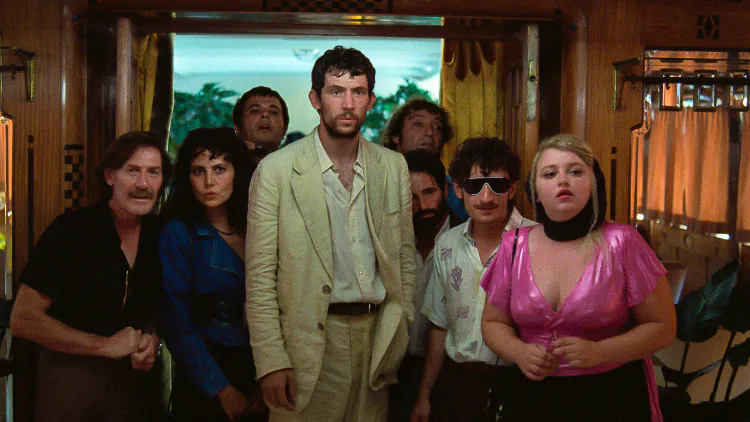<em>La Chimera</em>’s Scruffy Mysticism
Alice Rohrwacher’s stunning new film is a deft balance of weariness and wonder.

La Chimera confirms a stereotypical suspicion I’ve had about life in Italy: You’re only a couple of costume changes away from joining a circus troupe. Alice Rohrwacher’s beguiling new film is not about a bunch of traveling entertainers, but it follows a cadre of oddly dressed and accessorized eccentrics who add pops of song and color wherever they go. At first glance, it’s as if the Italian giant Federico Fellini never left cinemas, but there’s a faded quality to Rohrwacher’s world—a sense that it takes more and more effort to keep any magic alive.
Rohrwacher, whose prior films include the winsome dramas Happy as Lazzaro and The Wonders, specializes in films that blend myth with modernity. She’s part of a long tradition of surrealism in Italian filmmaking, though she also confronts the country’s areas of spiritual or social decay, as more grounded directors such as Roberto Rossellini did after the Second World War. Although La Chimera is set in Italy’s turbulent 1980s, it is concerned with the country’s ancient past, tracking a network of whimsical tombaroli (“grave robbers”) who plunder tombs for precious artifacts. This particular group is led by a swoony British archaeologist named Arthur (played by Josh O’Connor) who is somehow psychically attuned to the land beneath him.
I’d forgive anyone for thinking this all sounds a little too precious, but that’s Rohrwacher’s storytelling skill: She can make such a fairy tale feel familiar without sapping it of its dreamlike charm. The world that Arthur and his pals inhabit is often gray and crumbling; the manse of Arthur’s patron, an imposing dowager named Flora (Isabella Rossellini), is a once-beautiful edifice that has deteriorated into a series of empty rooms. The film begins with Arthur asleep on a train that is snaking through the beautiful Tuscan countryside—he’s unwashed, shabbily dressed in worn white linen, and practically growling at the Italian girls who take an interest in him. There’s a layer of grime, but Rohrwacher doesn’t let us forget the allure beneath the surface.
That sense is embodied by O’Connor’s odd-man-out performance as a morose Brit among the multicolored, party-animal tombaroli. O’Connor is an actor I know best for playing stiff-lipped, awkward prigs such as Prince Charles in Netflix’s The Crown, and Mr. Elton in the 2020 adaptation of Jane Austen’s Emma. But he’s something quite different here: a sweet, mournful alien of a person who seems to exist with one foot in another dimension, or at least another century.
[Read: Archaeology’s information revolution]
Arthur’s interest is Etruscan art, the largely buried leftovers of the civilization that existed before the emergence of the Roman Empire, meaning he and his band of misfits are plundering below the foundations of Italian culture toward something almost mystical. It fits, then, that Arthur’s process of discovering these buried tombs is completely inexplicable; he’s like a human dowsing rod, collapsing once he’s atop the right spot. The tombaroli illegally sell their finds on the black market, but there’s still a charmed, amateurish quality to their foraging: Their goal isn’t to strike it rich, but to encounter something special along the way.
If La Chimera were set further back in the past, it’d be a perfect Fellini homage, summoning the anarchic, revelatory spirit of La Strada or Nights of Cabiria. But by planting the movie in the 1980s, Rohrwacher casts a sad glance at her country’s postwar development, depicting a land of eroding infrastructure, bumbling cops, and a cutthroat, capitalistic market for the artifacts Arthur is hunting. A ruthless buyer named Spartaco (played by Rohrwacher’s sister, Alba) shows up late in the action on a luxury yacht; sporting imposing shoulder pads, she represents the intrusion of a less romantic era.
But as the drama tumbles around the Italian countryside, Rohrwacher’s focus is largely on Arthur, who is in a grief-stricken haze when the audience meets him: He’s recently lost his partner in crime and love, Beniamina, Flora’s daughter. In the aftermath of her death, Arthur is living an itinerant existence in a shack near Flora’s estate; both his hovel and her grand but desolate home are tombs of their own, waiting to be plundered thousands of years in the future by some other brave troupe. Through her young career, Rohrwacher has deftly mixed themes of love and loss with something a little more cosmic, and La Chimera is the best example yet of that heady blend. Arthur’s ennui keeps the film from ever behaving like a caper movie—every time he and his group enter a tomb, there’s some reverence for the space they’re disturbing, the long-forgotten resting place of another melancholy soul.
What's Your Reaction?




















